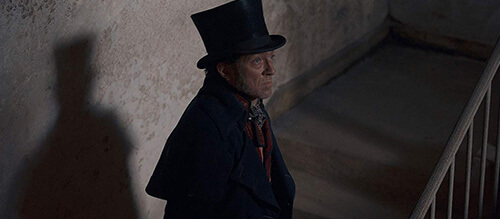The Emperor of Paris (2019) Review
L’Empereur de Paris (2019)
Director: Jean-François Richet
Screenwriters: Éric Besnard, Jean-François Richet
Starring: Olga Kurylenko, Vincent Cassell, Freya Mavor, August Diehl, Denis Ménochet, Fabrice Luchini, Denis Lavant, William Sciortino, Patrick Chesnais
French historical epic The Emperor of Paris, from Mesrine and Assault on Precinct 13 director Jean-François Richet, is an action-based chronicle of famed Napoleonic-era figure François Vidocq (Vicncent Cassell) that has more in common with mythical action epics like Gladiator and Braveheart than a by-the-books historical account, the narrative following the peaks and troughs of traditionally mythical tales, the likes of which modern audiences may more readily associate with superhero cinema; and the result is truly quite remarkable.
Vidocq, an enigmatic and somewhat legendary loner criminal played terrifically by Vincent Cassell in his best archetypal damaged and serious man character for years, is thrust back into the consciousness of the authorities when a street walker by the name of Annette (Freya Mavor) lands in his lap, causing the famed fighter to turn his attention away from anonymity and instead towards amnesty, lending his hand to the untrustworthy government in order to rid the streets of his rivals and bid for his own freedom. Meanwhile, an acquaintance to whom he owes his life, Nathanaël, played by the scene-stealing August Diehl, has risen to be a prominent figure of the very underground that Vidocq is viciously closing down. The two must eventually come head to head, the winner becoming the true Emperor of the Parisian Underground; the Emperor of Paris.
Bringing together its major strengths in every aspect of the filmmaking, from a fantastic use of a noteworthy score that hits like a drum as if igniting the myth of this famed individual following a gritty opening prologue, to the CG which effortlessly covers gaps left by safety concerns (action sequences, a fire, for example) and the differing landscape of 200 years ago to create a realistic albeit recognisable historic Paris, The Emperor of Paris showcases the undeniable talent of its director, a man whose English language work has never seemed to move the needle beyond the level of “good”, but whose native efforts continue to be the source of intrigue.
A concoction of violence, corruption, betrayal and alcohol, Richet’s movie features all the hallmarks of an episode of ‘Game of Thrones’ only more French. Famous historical landmarks litter the landscape to reinforce the notion of radical change that is the undercurrent of the whole piece, Napoleon’s rise to being Emperor of France thrusting the nation into a new era lawfully, culturally, architecturally and criminally, the latter of which is of course the main focus.
Though the screenplay is littered with typical blockbuster fuzz like characters introducing themselves somewhat unnaturally just to keep us (as the paying customers) up to speed, the narrative actually hits its beats with great thematic and emotional effect, the result being a film that may be lacking in scintillating verbal exchanges but features so many twists and turns that the film remains at a very tidy, snappy speed for the duration of its 110 minute run-time.
Capturing every moment with a dash of brilliance here and there is the work of the cinematographer Manuel Dacosse (Evolution – 2015; The Confession – 2016), whose use of camera movements in particular grants the movie much of its Sweeping Epic look, the very positioning of the lens being a refreshing visitation to a seemingly bygone era in which the camera’s movement would always indicate changes in perspective or anchor points within the narrative. This is an element that adds a lot to the finished piece, its work in conjunction with the 2019 César Award winning work of the production design and costume design departments working to not only mould a believable past that feels truly lived in, but to also offer moments of true cinematic expression; a rarity within the genre.
The Emperor of Paris is, then, a largely very good film with some visual and narrative elements so strong that they mask underlying issues such as the, at times, lacklustre dialogue and one or two less than captivating action sequences. Cassell and Diehl are equally as excellent as one another in the lead roles, while secondary characters are prominently featured and are mostly afforded the opportunity to complete their own character arcs separate from the leads, their valued presence assisting in the picture’s incredibly successful development of narrative stakes, keeping the movie ticking at a rapid pace right through until the end; providing thrill after thrill in an intelligent blockbuster the likes of which we haven’t seen in years.
18/24
[DISPLAY_ULTIMATE_SOCIAL_ICONS]


